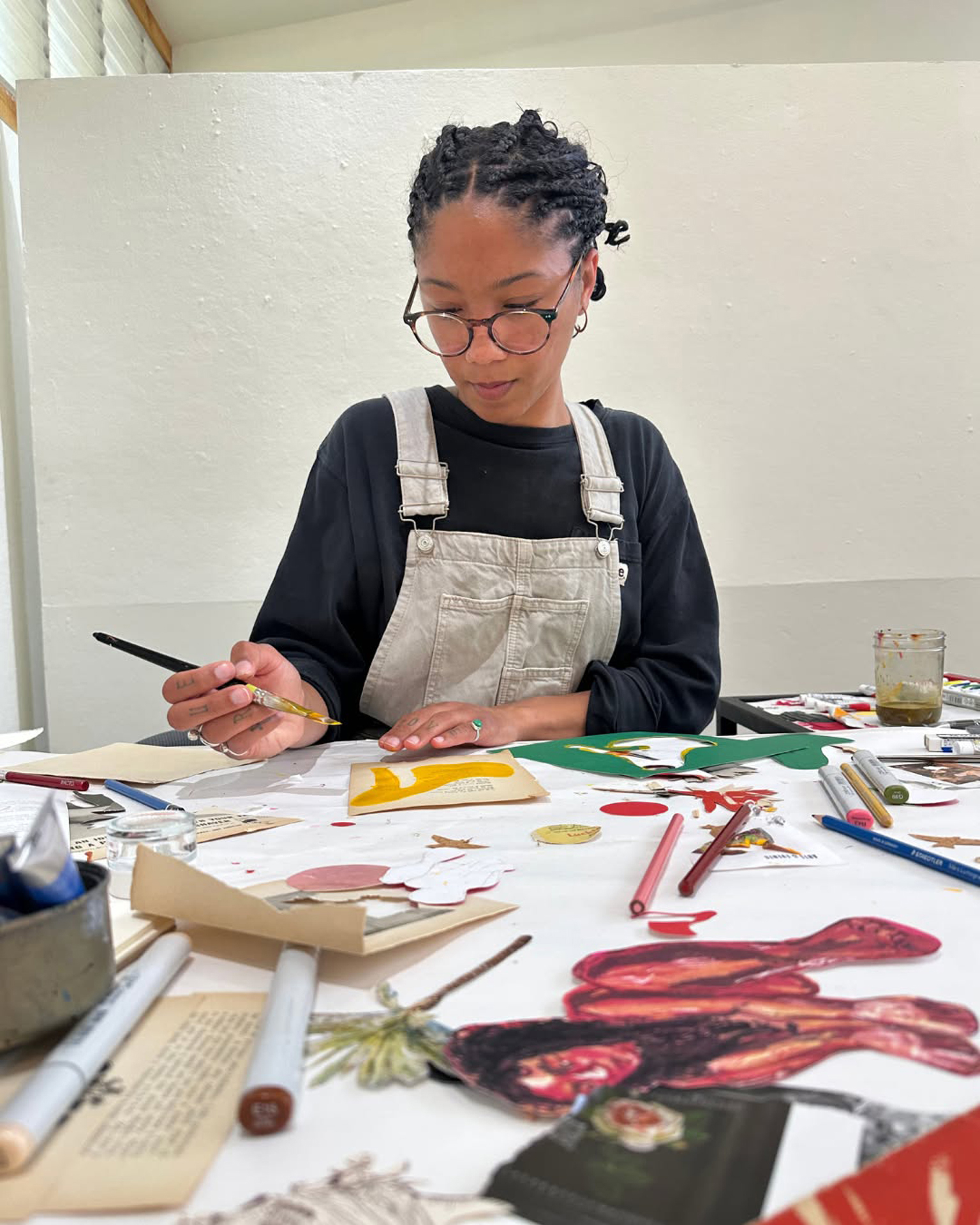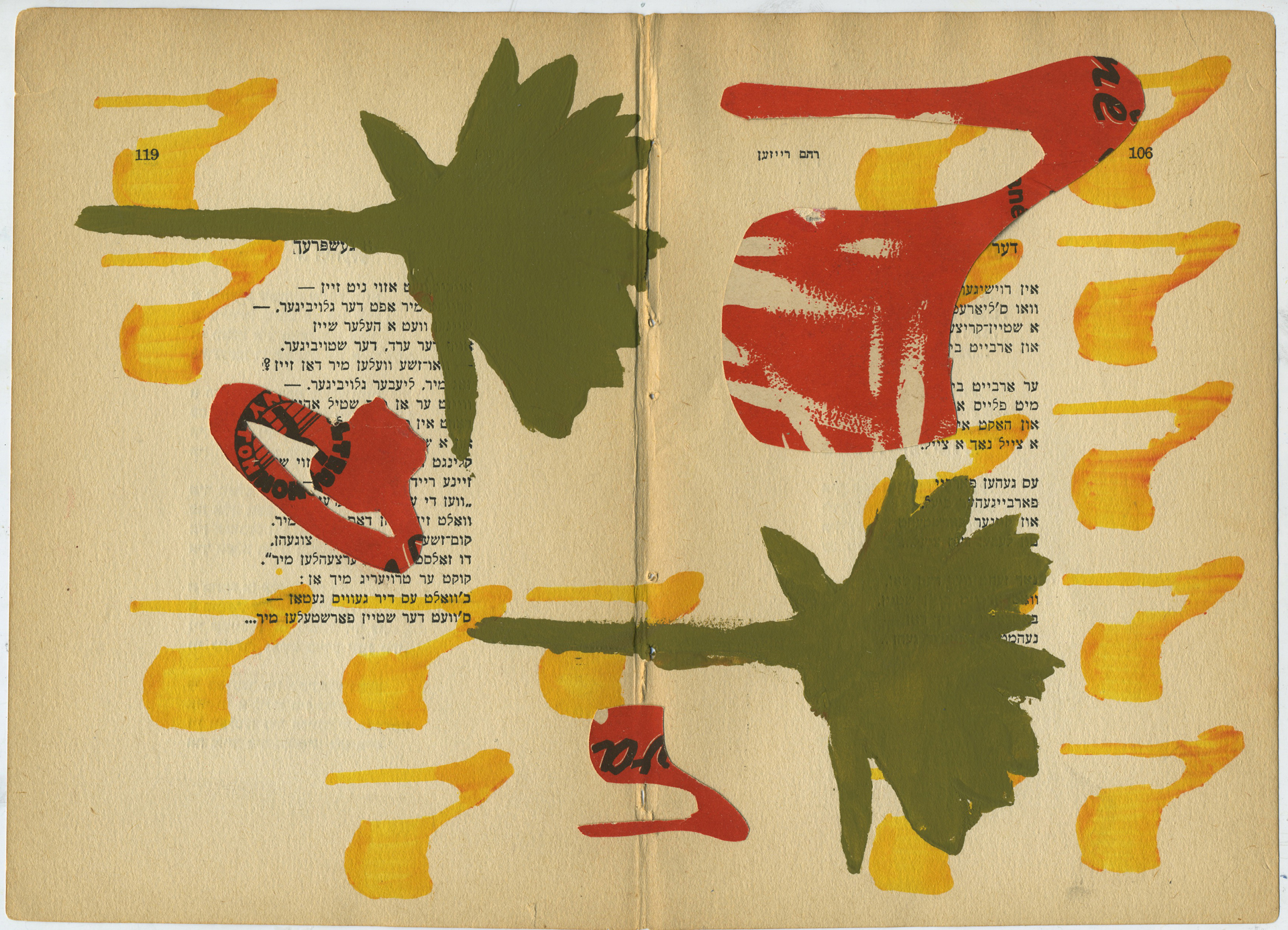Aug. 5, 2025
Ferris State student poised for transformative senior year after experiences at one of America’s premier art centers

Students at Ferris State University’s Kendall College of Art and Design have been invited to deepen their skills and expand their career possibilities at one of the nation’s most prestigious workshops for artists and makers for the past several years—and they’re making the most of the opportunity.

This artwork was created by Britney Yonkers, a Ferris State University Kendall College of Art and Design student, during a workshop at Anderson Ranch Arts Center 5.
Studio Arts major Britney Yonkers is the latest Ferris State KCAD student to receive a full scholarship to attend a summer workshop at the Anderson Ranch Arts Center, a sprawling five-acre campus in Snowmass Village, Colorado, that’s been an epicenter for creative networking and professional development since its founding in 1966.
The scholarship, along with a travel stipend supplied by KCAD, enables students to meet other artists in the field, learn new methodologies, expand their processes, and envision their futures in the arts.
“Every semester we've worked with Britney, we've witnessed her dedication to her studio practice and academics and her insightful, constructive feedback for her peers,” Studio Arts professor Danielle Wyckoff said. “The experiments and pieces Britney developed at Anderson Ranch while learning with other artists has broadened her approach to the excellent work she's been creating, and I'm so excited to see how her thesis research comes together after this experience.”
Yonkers, who’s entering her final year in the Studio Arts program this fall, was looking for an experience that led her into uncharted creative territory.
She found just that in a weeklong collage and gouache workshop led by Shoshanna Weinberger, a Jamaican-born artist who earned her Master of Fine Arts degree from the Yale School of Art.
“Shoshanna was adamant about not putting so much pressure on ourselves to make something that we love,” she said. “She wanted us to do things that we hadn't before, use new materials, try new methods—I pushed myself way outside of my comfort zone.”
Prior to Anderson Ranch, Yonkers had only ever experimented fleetingly with collage and gouache, an opaque type of watercolor paint. She primarily works in chalk pastel and graphite, creating pieces that feature the human figure and explore themes of womanhood, social taboos, and the connection between people and the natural world.
Working with Weinberger pushed Yonkers to slow down her process and embrace both mediums as new avenues of exploration and expression. After scouring stacks of magazines and cutting out interesting elements, participants were encouraged to “rehearse” their collage compositions before gluing anything down, and to tinker around with layering other mediums on top.
“Taking all that time to experiment and think through what I was going to do just allowed me space to really play around and not commit to one kind of setup or landscape,” Yonkers said.
Her resulting body of work—a series of smaller pieces and one large one, all collage layered with sketching marker and gouache paint—ultimately felt like a natural extension of what she’d been developing at KCAD. Being able to see her creative practice in a new light was invaluable.
“In the past, and even now sometimes, I’ve latched onto this idea that if I'm going to create something that is cohesive and looks like it's all something that I've made, then it needs to follow these very specific rules so that it all looks the same,” Yonkers said. “This experience really showed me that it’s more about the process than the product—no matter what I make, it’s all going to look like mine.”
Sharing space and ideas with the other creatives running and participating in workshops at Anderson Ranch also helped Yonkers expand her thinking around how she wants to carry her skills and education out into the world post-graduation.
During down times she was encouraged to wander the complex and connect with other artists, designers and instructors. That experience, coupled with the immersive nature of the workshop and its surrounding environment, led her to reconsider the role the studio plays in her journey.
“This experience showed me I need to ensure that I'm carving out that time to work on my practice,” she said. “It's also about eliminating distractions and allowing yourself enough time and space to explore and experiment, because if you don't have that room to think or play around, then you're not going to move forward.”
As she prepares to begin her final year at KCAD this fall, Yonkers feels inspired to continue pushing her limits—both in terms of how she leverages studio time and how she wants to widen her sphere of creative support and influence.
“Anderson Ranch gave me the motivation I needed for my last year to put myself out there and meet new artists,” she said. “I want to collaborate with artists whose work doesn't look anything like mine or who isn't necessarily focused on the same topics or concepts that I am so I can find more ways to expand my horizons.”
Yonkers also hopes to continue building on narrative, curated projects she’s developed in the past, like “Abortion Stories,” a series in which she collected anonymous stories from women willing to share their experiences with abortion. What started as sharing these stories in a zine grew into a full exhibition, displayed in the KCAD Gallery 602 this past spring.
At its core, this aspect of Yonkers’ practice is less about her own creative expression and more about tapping into the power of art to connect people and find shared truths across their individual experiences.
“‘Abortion Stories’ made me realize how important it is to reach out to others because you never know who is going through what or who's had what experience,” she said. “And I think more important now than ever before to recognize that we have a lot that connects us a different people than divides us.”
And beyond her own path forward, Yonker hopes to see others benefiting from the same kind of transformative experiences she had at Anderson Ranch, and the same level of support she’s received from the KCAD faculty and administration.
“Knowing that you have the support of your school, and that your professors and other people see something in you and want to give you this experience—that meant the word to me,” she said. “You can’t put a price on how experiences like this expand your perspective and renew your confidence in yourself.”

